Related Research Articles
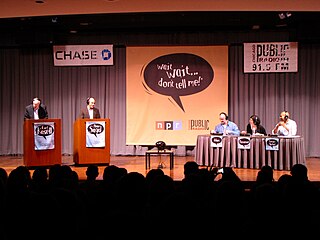
A panel show or panel game is a radio or television game show in which a panel of celebrities participate. Celebrity panelists may compete with each other, such as on The News Quiz; facilitate play by non-celebrity contestants, such as on Match Game and Blankety Blank; or do both, such as on Wait Wait Don't Tell Me. The genre can be traced to 1938, when Information Please debuted on U.S. radio. The earliest known television panel show is Play the Game, a charades show in 1946. The modern trend of comedy panel shows can find early roots with Stop Me If You've Heard This One in 1939 and Can You Top This? in 1940. While panel shows were more popular in the past in the U.S., they are still very common in the United Kingdom.

John Florence Sullivan, known professionally as Fred Allen, was an American comedian. His absurdist topically-pointed radio program The Fred Allen Show (1932–1949) made him one of the most popular and forward-looking humorists in the Golden Age of American radio.

Oscar Levant was an American concert pianist, composer, conductor, author, radio game show panelist, television talk show host, comedian, and actor. He had roles in the films Rhapsody in Blue (1945), The Barkleys of Broadway (1949), An American in Paris (1951), and The Band Wagon (1953). He was awarded a star on the Hollywood Walk of Fame in 1960 for recordings featuring his piano performances. He was portrayed by Sean Hayes in the Broadway play Good Night, Oscar, written by Doug Wright. Levant appeared as himself in the Gershwin biopic Rhapsody in Blue (1945).

Wait Wait... Don't Tell Me! is an hour-long weekly news radio panel show produced by WBEZ and National Public Radio (NPR) in Chicago, Illinois. On the program, panelists and contestants are quizzed in humorous ways about that week's news. It is distributed by NPR in the United States, internationally on NPR Worldwide and on the Internet via podcast, and typically broadcast on weekends by member stations. The show averages about six million weekly listeners on air and via podcast.
Twenty questions is a spoken parlor game which encourages deductive reasoning and creativity. It originated in the United States and was played widely in the 19th century. It escalated in popularity during the late 1940s, when it became the format for a successful weekly radio quiz program.
Information Please is an American radio quiz show, created by Dan Golenpaul, which aired on NBC from May 17, 1938, to April 22, 1951. The title was the contemporary phrase used to request from telephone operators what was then called "information" and later called "directory assistance".
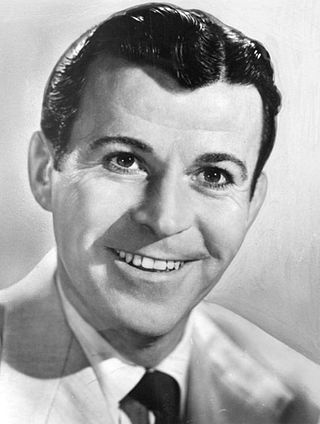
Dennis Day was an American actor, comedian and singer. He was of Irish descent.

Quiz Kids is a radio and TV series originally broadcast in the 1940s and 1950s. Created by Chicago public relations and advertising man Louis G. Cowan, and originally sponsored by Alka-Seltzer, the series was first broadcast on NBC from Chicago, June 28, 1940, airing as a summer replacement show for Alec Templeton Time. It continued on radio for the next 13 years. On television, the show was seen on NBC and CBS from July 6, 1949, to July 5, 1953, with Joe Kelly as quizmaster, and again from January 12 to September 27, 1956, with Clifton Fadiman as host.

It Pays to Be Ignorant is a 1942–1951 radio comedy show which maintained its popularity during a nine-year run on three networks for such sponsors as Philip Morris, Chrysler, and DeSoto. The series was a spoof on the academic discourse on such authoritative panel series as Quiz Kids and Information Please. At the same time, the beginning of the program parodied the popular quiz show Doctor I.Q. With announcers Ken Roberts and Dick Stark. The program was broadcast on Mutual from June 25, 1942 to February 28, 1944, on CBS from February 25, 1944 to September 27, 1950 and finally on NBC from July 4, 1951 to September 26, 1951. The series typically aired as a summer replacement.

Can You Top This? was a radio panel game in which comedians told jokes and tried to top one another. The unrehearsed program, sponsored at one point by a papaya-flavored soft drink called Par and later by Colgate-Palmolive, was created by veteran vaudevillian "Senator" Edward Hastings Ford, who claimed he was taking part in a joke session at a New York theatrical club when he conceived the idea. However, the format was quite similar to a prior joke-telling radio series, Stop Me If You've Heard This One (1939–40), which featured Ford and cartoonist Harry Hershfield as panelists. Many jokes involved ethnic humor told in dialect.
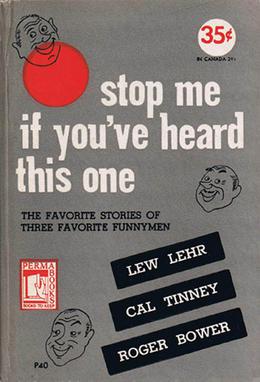
Stop Me If You've Heard This One was a comedy radio series, created by the actor-humorist Cal Tinney and sponsored by Quaker Oats. Hosted by Milton Berle, it aired Saturday evenings at 8:30pm on NBC beginning October 7, 1939.
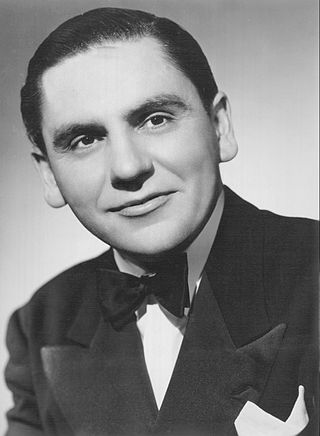
Bob Hawk was an American radio quizmaster and comic whose early work in radio set the standard for the "man in the street” interviews.

Professor Quiz was radio's first true quiz program, broadcast with many different sponsors from 1936 to 1948 on CBS and ABC. The program featured Professor Quiz, his wife Betty, and his son, Professor Quiz Jr. The program's announcer was Robert Trout.
One Minute Please is a panel quiz show hosted by Ernie Kovacs aired on the DuMont Television Network from 6 July 1954 to 17 February 1955 on Tuesdays at 9pm ET.
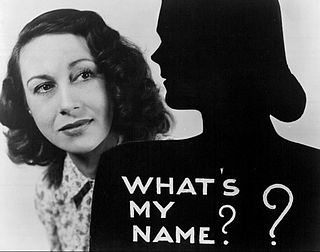
What's My Name? was a 30-minute radio program in the United States. The program was hosted by Arlene Francis and was among the first radio shows to offer cash prizes to contestants.
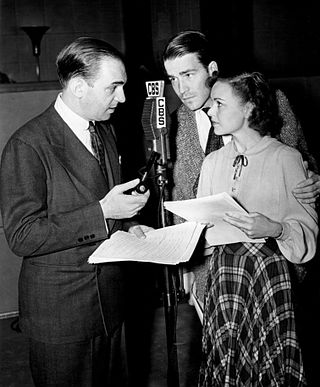
The Adventures of Ellery Queen was a radio detective program in the United States. Several iterations of the program appeared on different networks, with the first one broadcast on CBS on June 18, 1939, and the last on ABC on May 27, 1948.
The Fred Allen Show is a long-running American radio comedy program starring comedian Fred Allen and his wife Portland Hoffa. Over the course of the program's 17-year run, it was sponsored by Linit Bath Soaps, Hellmann's, Ipana, Sal Hepatica, Texaco and Tenderleaf Tea. The program ended in 1949 under the sponsorship of the Ford Motor Company.

Kay Kyser's Kollege of Musical Knowledge is an American old-time radio musical quiz program starring Kay Kyser. It was broadcast on Mutual, NBC, and ABC beginning on February 1, 1938, and ending on July 29, 1949.
Appointment with Music is a half-hour American radio music program that was broadcast on NBC beginning on June 30, 1948.
Anyone Can Win is an American television quiz program that was broadcast on CBS from July 14, 1953, until September 1, 1953.
References
- 1 2 3 4 5 6 Dunning, John (May 7, 1998). On the Air: The Encyclopedia of Old-Time Radio. Oxford University Press. p. 393. ISBN 978-0-19-984045-8 . Retrieved July 5, 2023.
- ↑ "George Murphy's 'H'wood' As Benny Replacement; 'Author,' Pickens Also Set". Variety. June 23, 1948. p. 22. Retrieved July 5, 2023.
- 1 2 "The News of Radio: 'Let's Talk Hollywood,' Screen Quiz Show, to Hold Down Jack Benny Time" . The New York Times. June 24, 1948. p. 50. Retrieved July 5, 2023.
- ↑ "KGU News". The Honolulu Advertiser. July 11, 1948. p. 10. Retrieved July 5, 2023– via Newspapers.com.
- ↑ "How Germans in Caribbean Guided Subs Told on Air Show". The Austin American. August 8, 1948. p. 7-B. Retrieved July 5, 2023– via Newspapers.com.
- ↑ McHatton, Martha (September 4, 1948). "Indianapolis on the Air". The Indianapolis News. p. 18. Retrieved July 5, 2023– via Newspapers.com.
- ↑ "Fingers Deep In Many Pies". Billboard. November 26, 1955. p. 1. Retrieved July 5, 2023.
- ↑ Terrace, Vincent (September 2, 2015). Radio Programs, 1924-1984: A Catalog of More Than 1800 Shows. McFarland. p. 197. ISBN 978-1-4766-0528-9 . Retrieved July 5, 2023.
- ↑ "Let's Talk Hollywood". Variety. July 7, 1948. p. 23. Retrieved January 30, 2024.